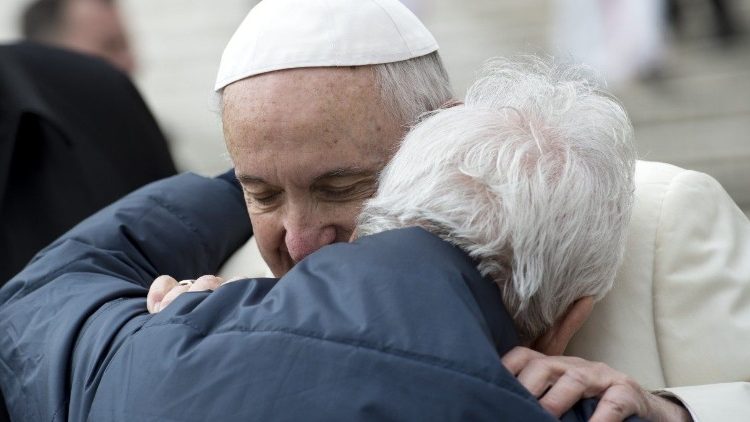Jubilee from illness
Finding light in illness and reconciliation in pain

Pope Francis, being old and sick, has called for the Jubilee of Hope. The bull of convocation does not lack references to old age and illness.
Knowing the human soul, one sees the desire for hope to reach the darkest corners of pain.
For the sick it is also the jubilee of hope.
When I was responsible for the Pastoral of Health, we insisted on the idea that one was sick, not that one was sick, as if the illness did not have to give you identity, but that it was one more facet of life, a state. Now, with more than ten years of suffering from Parkinson’s disease, although I cannot affirm that what defines my person is the illness, we must agree that there is a before and after diagnosis. When the illness becomes permanent, it becomes a traveling companion that we have not invited, but it will always be there. Like the passenger who sits next to us, we should not ignore that it is in the same carriage as us. We should not let it invade us, but we should attend to its requirements. We should accept the limitations without submitting to them.
Most illnesses are complex, personal, and non-transferable. The perceptible symptoms externally are in most cases the tip of the iceberg, something that is visible, but which hides a list of difficulties that the patient suffers and endures in silence in a permanent attempt to respond to normality. Let others not notice it. So that in addition to denying the symptoms, we can feel guilty about the deficiencies that they cause. Depression and anxiety, for example, are common, they usually accompany most illnesses and cause more difficulties than muscle stiffness or involuntary movements in the case of Parkinson’s, for example. Psychological symptoms, so misunderstood by those who do not suffer from them, are often attributed to the patient’s ill will. When this happens, and the patient blames himself for his sadness and anxious behavior, he enters into a kind of loop that increases, if possible, the depression. It is not difficult to understand the association that the Jewish people made between illness and sin. “Who sinned, he or his parents?” Jesus is asked in Jn. 9, 2-3. Now he does not associate illness with sin, but he does tend to judge the patient’s behavior, holding him responsible for his condition. Morbid obesity, to name one of the most common attacks on the person who suffers from it, or any mental illness. “You are like this because you want to be” is heard more than once.
Job’s friends let him know that God is never wrong. In the opposite direction, the same patient is the one who judges God for having sent him this evil. There is a conflict of faith. “If God loves me, why do I have to be sick?”
Sometimes it is the sick person who condemns himself as a bad child of God. Because the lack of a joyful vital tone, pessimism, tiredness and fatigue are attributed not to a lack of health, but to a lack of faith. “A sad saint is a sad saint,” it is often said. This causes feelings of frustration and sin in the face of a lack of joy. Above all, when sadness is a sign of defeat in such a “positive” world. Many vocational crises both in religious life and in marriage are caused by a poor tolerance of the defeat of illness.
The jubilee is not going to cure our depression or chronic fatigue, but it is going to put us in the perspective of forgiveness. Forgiveness is a source of joy. Forgiving ourselves for our anxieties and depressions is the beginning of the Health that Jesus comes to bring.
Therapy is important to clarify behaviors and develop coping strategies, but as Josef Pieper states in his book on the concept of sin, only forgiveness is enough to repair the damage caused. There are many philosophies that come close to explaining evil and the person’s responsibility for sin, but they do not have the power of that Someone who forgives us from the root.
Others, those who live with the sick person, family and friends and society in general, are also affected by the disease. Relationships are hampered. Sometimes the closer the person is, the more the wound is touched.
I remember that AIDS patient, at the beginning of the disease, when it was fatal, who was so extremely distressed that he isolated himself from everyone, hiding his pain, not showing himself to be weak, but quite the opposite. He was kind and polite. A charming patient. On the other hand, when his own mother visited him, he threw all his frustration at her, so much so that the lady always came out crying at the verbal aggression of her son. Only the one who carried him in her womb could he vent his rage. Only she was a “mother” in the face of her son’s pain.
The Jubilee of Hope, in that it wants to return us to the initial state of baptism, proposes the sacrament of reconciliation as an opportunity to recognize sin and ask for forgiveness for the effects that our illness indirectly causes in our relationship with others.
Forgiving others
Imperfection, sadness, physical clumsiness, obsessions, slowness, fears, cognitive distortions and other effects of illness are often poorly tolerated by others.
There is a tendency to want to hide the sick person. Why doesn’t this or that leader, pastor, politician who suffers from such an illness retire? The standard of normality is very strict.
The productivity to which the world subjects us causes the sick to be marginalized. The Pope in the bull speaks of patience. Something that the sick person must necessarily learn and that is not so easy for others to understand: He says: “we are accustomed to wanting everything and immediately, in a world where haste has become a constant. There is no time to meet people anymore, and often even in families it becomes difficult to meet and talk calmly. Patience has been relegated to the back burner, causing serious harm to people. In fact, intolerance, nervousness and sometimes gratuitous violence take its place, causing dissatisfaction and narrow-mindedness”.
However, the clichés, the remedies for everything, the sciences and pseudosciences available to any television viewer or Internet surfer make the patient feel useless in the face of the solutions proposed by others. As an example and to add a bit of humor, I remember having to listen to absurd “advice” regarding Parkinson’s. “It goes away with a cup of coffee” and this other one: “bathing in very hot water, almost burning, will restore mobility.”
The main reason is that the disease causes a certain anguish in the other. That is why it is difficult to visit sick people, because the disease causes a certain uneasiness in the visitor. The way to stop or get rid of this anguish is to avoid all responsibility for the patient. They are advised and prescribed remedies without being health professionals, or on the contrary, they are sent to the association of those affected by this disease so that they feel protected. The relationship with the patient is professionalized. The famous self-help groups that do so much good, but which are a sign of society’s surrender to tolerate and integrate those who have some peculiarity.
The others, among whom we are also, even when being sick we come into contact with other ailments different from our own, do not have to understand the illness of the other.
The problem is when, due to the lack of understanding of our illness, we isolate ourselves individually or group ourselves in an exclusive ghetto for patients like us.
The others, those who do not understand our illness, have every right not to know, to give their opinion and to try to “help” in order to be calm. There is a lot of good will, even if it can cause harm with some ill words. We can perceive it as an aggression or as an inappropriate good intention, it depends on us. Forgiveness, from the start, facilitates dialogue and from forgiveness comes the truth.
The Jubilee invites us to live reconciliation. If we have accumulated resentments and misunderstandings, the year of grace that the Jubilee represents leads us to reestablish good relations with our surroundings. The Pope tells us again in the bull of convocation: “In the heart of every person there is hope as a desire and expectation of good, even if we do not know what tomorrow will bring. However, the unpredictability of the future gives rise to feelings that are often opposed: from trust to fear, from serenity to discouragement, from certainty to doubt. We often find discouraged people, who look to the future with skepticism and pessimism, as if nothing could offer them happiness. May the Jubilee be for everyone an opportunity to rekindle hope.”
Reconciled and reconcilers
The Jubilee allows us to enter into the dynamic of forgiveness, received and given. It is a return to the beginning.
If the disease causes discomfort, which in turn has a negative effect on the symptoms, it has also been proven that even though bad mood and sadness are often unavoidable, the mood helps to live the disease differently, and it seems to improve the symptoms. A friend, wife and mother, belonging to one of the groups of married couples in the parish, became ill with cancer. She had to stay in hospital for three months. After a while, I asked her about her state of mind, and she realized that I was surprised by her good mood. She told me: “I have not chosen this disease, I cannot, but I do want to choose the way to live it.”
In the key of the Jubilee of Hope, illness is experienced differently. I will end with another fragment of the bull. “But we all, in reality, need to recover the joy of living, because the human being, created in the image and likeness of God (cf. Gen 1:26), cannot be content with surviving or subsisting mediocrity, adapting to the present moment and letting himself be satisfied only by material realities. This encloses us in individualism and corrodes hope, generating a sadness that nests in the heart, making us unpleasant and intolerant.”
Related

Sensitivity in a Managerial Key: The Forgotten Muscle of Meaningful Leadership
Alejandro Fontana
08 April, 2025
3 min

That’s not my problem!
Hugo Saldaña Estrada
08 April, 2025
2 min

Orphans of Living Fathers
José Miguel Ponce
08 April, 2025
2 min

Who is a good person?
José Miguel Ponce
07 April, 2025
2 min
 (EN)
(EN)
 (ES)
(ES)
 (IT)
(IT)

